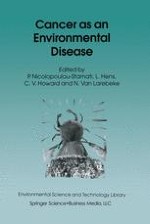2004 | OriginalPaper | Buchkapitel
Anti-Oxidants and Chemopreventive Agents as Cancer Enhancing Agent: The Other Side of the Coin
verfasst von : S. Z. Abdel-Rahman, M. Paolini, M. S. Legator
Erschienen in: Cancer as an Environmental Disease
Verlag: Springer Netherlands
Enthalten in: Professional Book Archive
Aktivieren Sie unsere intelligente Suche, um passende Fachinhalte oder Patente zu finden.
Wählen Sie Textabschnitte aus um mit Künstlicher Intelligenz passenden Patente zu finden. powered by
Markieren Sie Textabschnitte, um KI-gestützt weitere passende Inhalte zu finden. powered by
Since the nineteen eighties, public health agencies have emphasised the benefits of consuming a diet rich in fresh fruits and vegetables. Vegetables and fruits contain antioxidants, which are known scavengers for reactive oxygen species (ROS). Specific phytochemicals found in cruciferous vegetables are also believed to lead to the induction of phase II enzymes involved in the detoxification of reactive intermediates of chemical carcinogens. Decreases in levels of ROS, and increases in detoxifying enzymes are thought to be the basis for reduction in the risk of developing cancer by dietary means. Animal and epidemiological studies evaluating diets rich in cruciferous fruits and vegetables confirm the cancer preventive effects of such diets. On the basis of the beneficial results realised from these specific diets, one approach to cancer prevention includes dietary supplementation with specific phytochemicals and antioxidants, including beta-carotene (! CT) and various other carotenoids. Unexpectedly, two recent chemoprevention trials, the Alpha-Tocopherol Beta-Carotene Trial and the Beta-Carotene Retinol Efficacy Trial, showed that ! CT, either alone or in combination with vitamins A and E, could actually increase lung cancer risk and mortality in heavy smokers and in asbestos workers. These studies suggest that ! CT possesses co-carcinogenic properties. Similarly, several studies have documented the mutagenic and cancer-promoting activities of anti-oxidants and glucosinolate metabolites derived from cruciferous vegetables. In vitro and in vivo studies demonstrated that some anti-oxidants, while reducing ROS, also could be co-carcinogenic by up-regulating carcinogen metabolising enzymes and by the generation of reactive oxygen species. In contrast to the benefits of a complex diet rich in fruits and vegetables, individual supplementation with anti-oxidants may increase cancer risk by increasing levels of known carcinogenic metabolites.
